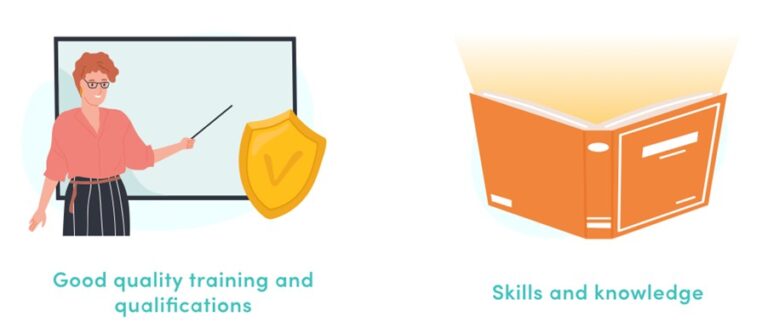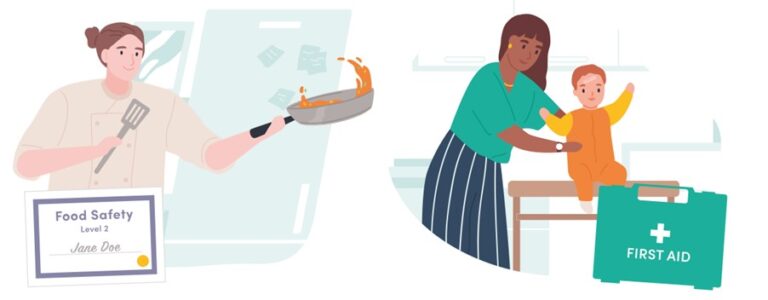Continuing Professional Development (CPD) in early years isn’t just a ‘nice to have’, it’s a statutory requirement. We know Ofsted is hot on looking at the professional development of your team, but also how well your practitioners truly know (and understand) the children in their care.
For your nursery practitioners to understand their children and how to move their development forward, they’ll need access to excellent EYFS CPD opportunities.
If you’re looking to brush up on your knowledge of what CPD must be given in early years, you’ve come to the right place. Let’s look at what CPD your practitioners should be getting each year.
What training is statutory in the early years?
The Early Years Statutory Framework sets out all the ‘musts’ for nursery managers. It covers the foundation that’s needed for areas like the EYFS curriculum, safeguarding and inclusive practice in your nursery.
“Providers must support staff to undertake appropriate training and professional development opportunities to ensure they offer quality learning and development experiences for children that continually improves.”
Section 3.26 in the 2021 EYFS Framework
The areas of statutory CPD in the early years are:
- Safeguarding training
- Paediatric first aid training
- Food hygiene training
- Relevant training to care for a child
- This includes managing medical conditions and administering medication
- Induction training for practitioners

Minimum qualification requirements for EYFS
Before we get to the CPD opportunities your practitioners need, it’s helpful to note the differences in terminology you’ll come across
The childcare field is unlike other private, voluntary or independent (PVI) sectors.
The term ‘training’ is often used for the additional learning an employee will undertake as part of their role. Whereas in the EYFS, ‘training’ and EYFS ‘CPD’ are distinct concepts.
EYFS training refers to the required qualifications early years practitioners must first have before they can be added to your nursery’s staff: child ratio.
EYFS CPD means the learning opportunities your team are given to ensure they are the best practitioner they can be.

EYFS safeguarding training CPD
Every practitioner working directly with children must receive training to ensure they can identify and respond to signs of abuse and neglect. This training must be refreshed regularly to keep staff up-to-date with the latest safeguarding policies and procedures.
EYFS safeguarding training also extends to any employee who comes into contact with children, including any employee maintenance or cleaning teams.
As a nursery manager or owner, you must prove that all your staff receive regular safeguarding training. Using an online CPD tracker and file uploader for your staff means you can readily access your CPD records for Ofsted inspections, training plans and performance management meetings with your team.
The safeguarding CPD must focus on their understanding of your safeguarding policy and procedures and how to use them to effectively safeguard the children in their care.
For school settings, Part 1 of Keeping Children Safe in Education (KCSIE) must be read and understood by staff. Although not a statutory requirement, it’s good practice for your nursery practitioners to have access to the document.
Looking at the safeguarding questions Ofsted may ask nursery practitioners and managers is a good way to assess your team’s confidence in applying your policies and procedures.
Alongside the foundation safeguarding training, your nursery leadership team including managers and Designated Safeguarding Leads (DSL) are required to undertake child protection training.
It is important to discuss your lead practitioner’s child protection training with your Local Safeguarding Partners (LSP) and your local authorities to ensure an appropriate course is found and to ask for an additional advice they may have.
Paediatric First Aid training
It’s a statutory requirement for at least one person who has a current Paediatric First Aid (PFA) qualification to be on the premises and readily available at all times (including offsite outings).
The training must last 12 hours to satisfy statutory requirements and be refreshed every three years. In addition, new staff members (Level 2 or 3) who qualified post-2016 must complete a PFA qualification within three months of beginning at your nursery.
Further information about what must be covered in a PFA training course and which staff members should be trained can be found on our Paediatric First Aid in EYFS blog.

EYFS Food hygiene training
Food hygiene CPD training is an essential for any nursery members responsible for preparing or handling food (this includes snacks, too).
For all staff preparing and handling food, including snacks, in group provision, there is a statutory requirement that they attend training in good food hygiene. You can find more information for your local area by contacting your local Environmental Health Department.
Early years administering medicine training
Where staff administer medication, including insulin, they must have received suitable training where they may need technical knowledge.
It is also necessary that the use of medication and administration is included in the information accessible on your nursery management system and risk assessments. Being able to pull reports on children’s allergies and medication information quickly improves the safety of the children in your setting.
It is worthwhile to remember that for the care and support of children under the age of 2, the statutory requirement is for half of all staff to be trained to care for babies specifically.
If you have a child with a specific Special Educational Need or Disability (SEND) or a medical condition, your local authority can guide you on where to find expert training for your team.
For example, if you have a child who is diabetic, the diabetes nurse team often come to give support and advice to schools and nurseries on how best to support the child.
It is useful to have access to a bank of specific early years training courses for your practitioners. Ensuring proactive measures can be taken when planning your early years CPD plans.

EYFS induction training CPD
Induction training involves any staff new to the setting, including apprentices. As managers or owners, you are responsible for ensuring the new team members engage with digestible information about all necessary areas of training.
These will include, emergency evacuation procedures, safeguarding (including child protection), as well as health and safety procedures, and best practices. The most effective way is via CPD practice scenarios and questions to prompt thinking.
You may find sharing frequently asked Ofsted questions with your team helpful, to focus their knowledge in particular areas like safeguarding.
It is important to note that nurseries that are proactive about their CPD plans don’t let training opportunities stagnate after a practitioner has completed their induction training.
Continually learning about child development, SEND, inclusive practice, self-regulation activities and the latest educational theories all help your practitioners to remain at the top of their field.
We also know that looking at evidence of staff professional development commitment was one of the recurring Ofsted inspection themes of 2024.
Get the latest DfE, Ofsted and EYFS-related events and news straight to your inbox by joining our Blossom blog subscribers.
How can Blossom help with mandatory EYFS training?
- Create staff rotas to accommodate staff attending training courses
- Track staff qualifications and skill gaps easily
- Automatically calculate work hours per week, including training hours
- Have complete visibility of where you may be understaffed
- Collect all important information about the child’s needs from families
With Blossom, you can quickly identify skill gaps, schedule statutory training, and ensure your practitioners are always up-to-date – all while keeping things simple and stress-free. Plus, our resources and expert guidance mean you’re never alone on your CPD journey.
Want to learn more about our Staffing and HR features?
Book a free, no-strings demo to see how we can help improve your nursery’s efficiency.